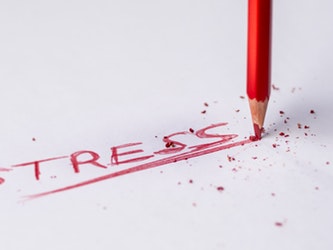
Image Source: Pixabay
Americans are notoriously over-stressed, and we don’t seem to be doing anything about it. Instead, we focus on piling more stress on ourselves and congratulate each other on lack of sleep. Stress negatively affects every part of your life including your physical, emotional, mental, spiritual, and social health. It’s linked to a myriad of diseases including heart disease, obesity, depression, and anxiety (to name just a few). It can be a trigger for chronic illnesses like eating disorders. It wreaks havoc on your relationships and encourages negative self-talk. Ultimately, it can even shorten your lifespan. Stress can keep us from nourishing our spiritual health and can be a factor in the destruction of families. Yet still, we consider it a natural and good thing it’s not. It might be part of our current culture, but there’s nothing good about it.
We can’t remove or avoid all the stress in our life, but there are ways to reduce it. For example, you might not be able to get away from the toxic co-worker all the time, but you can learn tools to combat their aggressions. Sadly, many of the “tools” we reach for when battling stress are harmful and can even make it worse. Alcohol, of course, is often used to reduce stress. It works in the short-term. Most people have experienced the lighter load that a drink or two can offer. However, it’s false, short-term, and potentially dangerous.
Here are five natural ways to relieve stress on a daily basis:
- Learn how to meditate. Don’t skip to the next number just yet. If you learn how to meditate, you can set up your day to be calmer or soothe yourself after a long and hard day. Meditation doesn’t require hours or many minutes. If chanting doesn’t work for you, try thumbing through mala beads or experimenting with a variety of guided online sessions. Meditation is a journey, and there’s no final destination. If you’re uncomfortable at first, that’s normal. Working through the discomfort is the key and can be meditation in itself. There’s even walking meditation, so don’t think you have to be stuck seated and still to get benefits.
- Improve your sleep hygiene. Ideally, you should be waking up without an alarm (but always set one just in case). Lack of sleep is one of the simplest things to correct and it’s within your control. Figure out how much sleep your body needs and go to bed with enough time to allow for it. Remove technology devices from the bedroom and make sure it’s as dark as and as quiet as possible. Experiment with white noise machines and weighted blankets. Treat yourself to sleep—it’s free and readily available (unless, of course, you have young kids).
- Wean yourself off the caffeine addiction. Caffeine is a stimulant, and stimulants can naturally kickstart stress hormones. Remember that caffeine is the most-abused drug in the world, and it’s truly addictive. No human should “need” it, and especially not on a daily basis. Start by switching to decaf for one cup of green tea instead. Like any addiction, it will take time, but if you’re committed your body will start to level out.
- Kick the tech addiction while you’re at it. Perhaps even more highly addictive than caffeine is technology. Most people can’t avoid it completely (like caffeine), which can make it especially difficult to manage. However, the stress of using technology and especially reading the news or social media is dictating many lives. Start by defining some no-tech times and zones. You’ll start to remember the joys of peace.
- Pet an animal. It doesn’t have to be your animal, and in fact, adopting a pet can be very stressful before it’s peaceful. However, petting animals is a free stress reliever that’s proven to work. Go to a dog park or a shelter. There are plenty of pets who will be happy for a little extra love and attention. Cat purrs are also proven to naturally sooth humans; it’s like they have built-in stress relievers just for you.
Going natural is almost always cheaper than reaching for easier fixes. It’s also safer and often has a positive snowball effect. Most people of all ages could do with a little less stress in their lives. If you do have children, remember that you’re constantly modeling behavior. Do you want your child to reach for a drink or a prescription pill when they’re older to relieve stress? Lead by example, and you won’t just help yourself but show your children a better way to peace, too. (See also: 10 Natural Stress-Relief Hacks You Have to Try)
About The Author:
Rachel is a freelance content writer located in San Diego, California. Over the course of her career, she has written a variety of health, parenting, and fitness articles. In her free time, she enjoys running along the beach with her two puppies and practicing yoga. Find her on Twitter.




